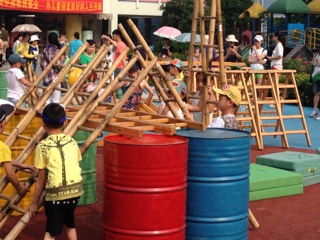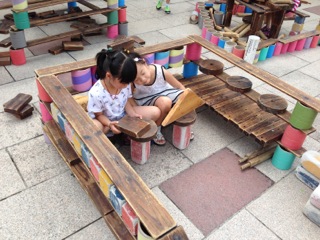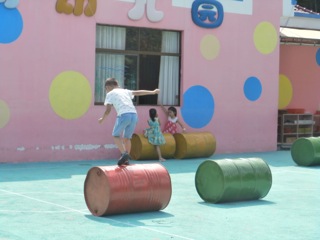Program Director Encourages Early Childhood Play
August 25, 2014 – Childhood play is more than scraped knees and grass stains—it’s a critical tool for development. Through play, children learn by solving problems, exploring, and practicing self-control. Penn GSE Senior Fellow Frances Rust wants to help teachers encourage playful activity, and in July she was invited to China to speak at the first Sino-U.S. Summit on Play.
“Play always has a purpose,” says Rust, who also serves as Director of the Teacher Education Program.

Children learn through their bodies by using sensory stimulation and spatial understanding. With hands-on engagement they develop intellectually, socio-emotionally, and physically.
In China, Rust first had the opportunity to visit schools near the Summit in Anji, a county in Northwestern Ziejiang Province. Their kindergartens exemplify imaginative and collaborative play with little to no resources - as well as the kind of playful learning atmosphere some Chinese educators hope to move towards.
At the Anji schools, Rust found many similarities to the Montessori method she was trained in. For example, play was developed independelty by the child and not directed by adults.

In these schools, there was little manufactured playground equipment. Instead, children climbed on ropes courses, engineered tunnels with found materials, and clambered up bamboo ladders.
Rust observed children working together to create obstacle courses. They lifted each other onto structures, and balanced on recycled oil barrels. Play was used as a tool for experimentation, both with themselves and their surroundings.
At the Summit, she participated in a presentation and panel discussion alongside Peter Mangione, the co-director of WestEd’s Center for Child & Family Studies. The event was hosted by the Anji County Board of Education and had an audience of over 900 educators from throughout China.
 Rust’s panel outlined the ways children learn through play. She arrived with a presentation focused on images from American schools, but was delighted to adopt examples from her observations in Anji.
Rust’s panel outlined the ways children learn through play. She arrived with a presentation focused on images from American schools, but was delighted to adopt examples from her observations in Anji.
Rust also found that there were valuable lessons in Anji playgrounds for Western schools. She hopes teachers will take risks and not limit children by lack of resources, materials, time, and space.
“Children’s play is their work,” says Rust. “It is important, purposeful, and a powerful form of learning.”
